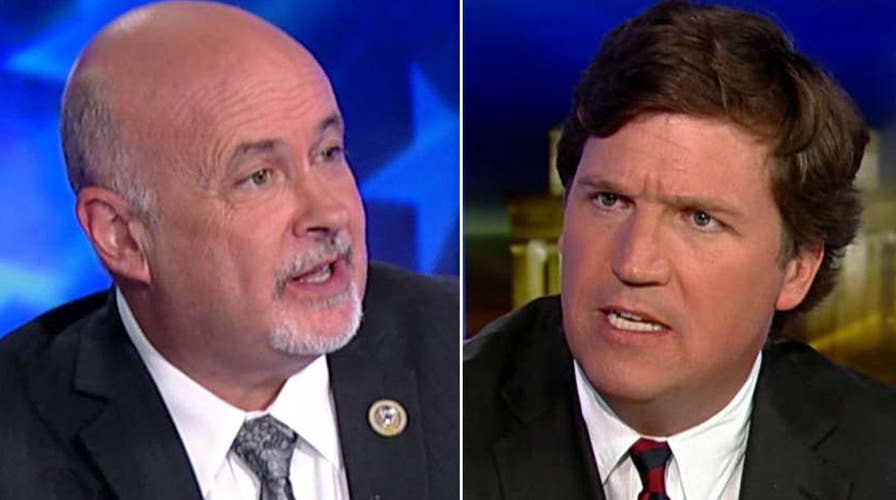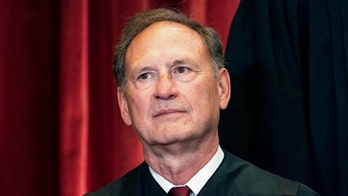Tucker to Dems: What was learned about collusion from Comey?
Tucker takes on two Democrats over what, exactly, was accomplished with James Comey's testimony before the Senate #Tucker
President Trump's legal team shot back Thursday at James Comey's Senate testimony, defending the president in a brawny statement against the fired FBI director's more damaging claims and asserting Comey himself could now be in legal jeopardy for his admission he'd leaked details of "privileged" conversations.
Trump's personal lawyer, Marc Kasowitz, also said Comey's testimony backed up Trump on key points -- affirming that the president "never sought to impede" the Russia probe, and that while he was FBI director, Comey told Trump several times he wasn't the subject of an investigation.
The president's lawyer issued the rebuttal in a written statement that he read to reporters during a brief post-hearing appearance.
The statement sought to shield Trump and shift scrutiny onto Comey, who on Thursday delivered dramatic testimony that stopped short of accusing Trump of obstruction of justice but made numerous other allegations.
Kasowitz tried to rebut them one by one.
Despite Comey's claims to the contrary, he emphasized Trump “never, in form or substance, directed or suggested” that Comey drop an investigation into ex-National Security Adviser Michael Flynn.
Kasowitz also denied Trump asked Comey for a pledge of loyalty, contradicting Comey's story and setting up a "he said-he said" between the former FBI boss and the president.
Kasowitz also cast doubt on Comey’s explanation as to why he decided to leak a memo describing the Flynn conversation after Trump had fired him as FBI director.
“Although Mr. Comey testified he only leaked the memos in response to a tweet, the public record reveals that the New York Times was quoting from these memos the day before the referenced tweet, which belies Mr. Comey's excuse for this unauthorized disclosure of privileged information and appears to be entirely retaliatory,” the statement said.
The New York Times wrote its first story about private conversations between Comey and Trump on May 11, though the Times made no mention of a memo existing to allegedly substantiate the encounter. The following day Trump sent an infamous tweet implying he had recorded the discussion himself: "James Comey better hope that there are no 'tapes' of our conversations before he starts leaking to the press!"
Comey suggested that tweet prompted him to leak his notes. Four days later the first story appeared in the press citing an alleged Comey memo.
Kasowitz, meanwhile, pointedly raised the question Thursday of whether Comey's leak amounts to a legal problem for him: “We will leave it to the appropriate authorities to determine whether this leak should be investigated along with all those others being investigated.”
Though Trump did not tweet or make a direct statement about Comey’s testimony, he did reference fighting back during a speech he gave to religious conservatives as Comey’s testimony was wrapping up.
“They will lie, they will obstruct, they will spread their hatred and their prejudice, but we will not back down from doing what is right,” Trump said. “We will fight and win, and we will have an unbelievable future. An unbelievable future. And it’s going to be together.”
Though Trump, a well-established prolific tweeter, has not sent a message from his account since Wednesday morning, he was certainly represented on the social media network. The Republican National Committee tweeted from its @GOP account, often hashtagging posts “#bigleaguetruth.”
“So according to Comey, @POTUS never asked to stop the investigation and Russia didn’t change a single vote. Good to know. #BigLeagueTruth,” one message read.
One of Trump’s children, Donald Trump Jr., was also tweeting a rapid-response defense of his dad.
Writing about Comey’s assertion that Trump intimated Comey should drop the Flynn investigation, Trump Jr. wrote: “Knowing my father for 39 years when he ‘orders or tells’ you to do something there is no ambiguity, you will know exactly what he means.”





